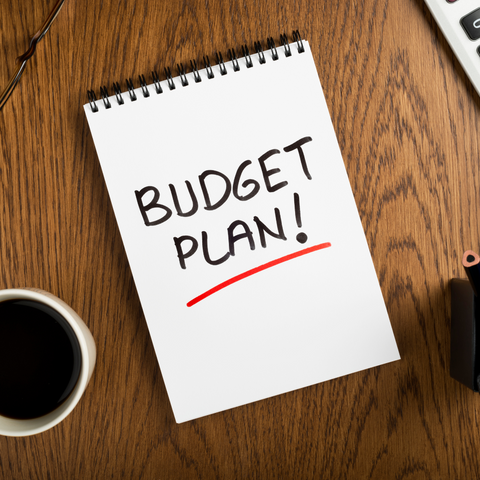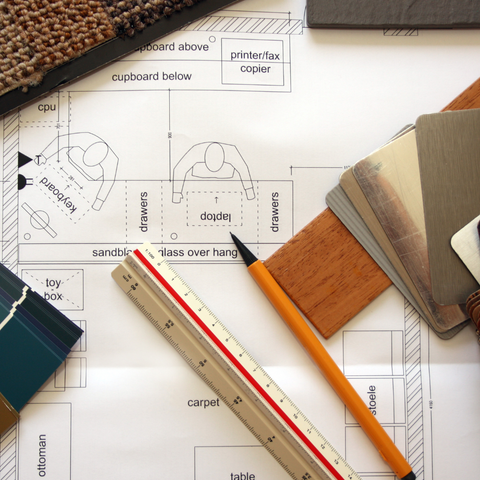
Should I love it or list it?
A Spring refresh
The start of spring somehow always seems to coincide with the inevitable spring clean. In some cases, this can highlight the niggles you have about your home.
These could be relatively minor, such as wanting to redecorate a room or it could trigger a larger debate about how your home is currently working for you. As time ticks by, our needs can change and a house that once worked may no longer tick all the boxes.
This may well evolve into the should I love it or list it debate.

Questions to ask yourself
- What is it that no longer works? Is it that you'd like more storage, need another bedroom or desperately want another bathroom?
- How do you use the space you have? Thinking about where you spend most of your time will help you identify which parts of your living space are the most essential to you. Open plan living has become really popular but has this left rooms unused or created corridors of dead space?
- Is the location right? Have you got a long commute? Are you too far from family? Do you have the amenities you want nearby? If location is the primary issue, home improvements are unlikely to solve your problems.
- Do you really need your house to work differently or do you just want more? Moving home can be an incredibly expensive exercise so it's important to identify just how essential a move or home improvement is. Challenge yourself to understand your motivation. If you have five children sharing two bedrooms and one bad bathroom, the endless squabbling will undoubtedly highlight just how much a change is needed. However if you have loads of space in a good location but would just like something a bit bigger, is this just a want as opposed to a need to make a change? That's not to say it's wrong, it's just about giving yourself clarity on the situation so you can justify whether the cost is worth it.
The aim of these questions is to figure out your priorities, which in turn will help you then decide whether to love it or whether to list it.

Love it costs
Whatever decision you make, there are going to be costs involved so thinking about this upfront will save you time, stress and possibly heartache at a later date.
Now that you've thought about how your home no longer works for you, and you've prioritised what changes you want to make, the next stage is to plan and cost model your project. You may be capable of doing this yourself, or you may need to bring in professionals such as an architect, structural engineer, kitchen or interior designer
Once you have a plan you are happy with, it's time to get some quotes. I always feel like this should be the easy bit, but having fully renovated two houses I tend to find that this is where the frustration sets in.
Finding good, reliable tradespeople is a bit like 'Challenge Anneka' for those of you old enough to remember the 90's show! Right now, tradespeople are in high demand and working at a premium. Getting them to turn up to look at your project is challenge one. Challenge two is then getting an itemised quote. I always try to get three quotes to compare and, wherever possible I try to use people who have been recommended by family or friends. I check reviews and check what insurance they have at these very early stages. Red flags for me are planned meetings being rearranged several times, along with having to chase for quotes. I always think that if I'm having problems/frustration at this stage, then what is it going to be like when my house is in a state of chaos mid job and something goes wrong. For me it's important to work with somebody who is honest and who communicates well with me.
Once you've got your quote it's important to assess if the planned work is affordable. This includes building in a contingency fund as I guarantee there will be additional costs that you were not expecting. The cost of materials has risen significantly in the last year and these could change again in the time between getting the quote and the project start date. Most people tend to work to their maximum budget from day one, so when costs change or problems arise it can feel really stressful trying to figure out how to cover the additional costs.
If the quote is affordable – that's great! But if it's not then now is the time to reassess your plans. Can compromises be made so you can still proceed? For example if you are putting in a new kitchen, you might want quartz worktops but actually solid wood will be much cheaper instead. Are there compromises that you can live with? Or actually is it a compromise too far and you'll never be happy with the end result?
Once you get to the point where you have an acceptable quote, you still need to consider what value it will add to your home, the ceiling price of your location and if the spend will give you sufficient value for money. Compared to moving home is spending to make improvements the right this decision? Does it fix all of the problems you identified? Will it give you a home you can love for several years? Will it give you a home that you'd make a profit on if you decided to list? With these questions answered you know whether to embark on challenge three which is getting your chosen tradespeople booked in.
As a final note, if you need to borrow money to complete your project you should explore your options and get this in place before booking your tradespeople and paying any deposits.

Team list it
I tend to think that if you are on team list it, you get the easier end of the deal! I mean who doesn't love the search for a new home and the excitement of thinking about how you can make it your own.
That said, finding the perfect home is easier said than done. Though it's great to have a list of criteria that you need or a specific location that you want to be in this can have the effect of creating a very narrow search. As a result you may take longer to find your new home than originally anticipated. Also beware of ruling out houses based on the online pictures. Sometimes they don't do the space justice and you need to physically see it to really gauge how it could work for you.
Budget is generally the starting point when you think about moving home. You need to get your house valued, assess your savings to see how much you could use, along with determining whether you will need to take a mortgage.
If you do need to use a mortgage, the first stage is to look at your affordability to see how much you are likely to be able to borrow. Most lenders have online tools for this and you can also use mortgage comparison sites. Using a mortgage broker can take much of the work out of it for you, as well as being able to answer your questions and perhaps give you the support and reassurance needed throughout the whole process. Once you've made all the numbers add up, the credit score/credit referencing process is the next stage to get a decision in principle from your chosen lender.
Funding the cost of your new home does extend much further than the initial purchase. You should also factor in costs such as:
- Estate agent fees
- Mortgage broker fees
- Legal fees
- Stamp duty
- Moving costs
- The cost of making any improvements needed to your new home
- The running costs of your new home – for example will your mortgage payment, council tax, energy bills or life and illness covers increase in cost?
- Hidden costs – Will you have a longer commute so your petrol spend will go up? Will you join a more expensive gym? Is there anything you will need to cut back on to afford the move?
With all that taken into account, is moving home still the right decision? Is it all affordable?

Decisions, decisions
So what started out as a bit of spring cleaning, may well have led to months of discussion and planning. But it's much better to be prepared and to think your plan through fully than make a rash expensive decision that you may regret!
You may also want to consider your longer term plans and the impact of the decision you make today. For example, taking a bigger mortgage now may mean having to work longer and delay retirement. Is that something you really want to do?
As someone who desperately 'wants' a new bathroom whilst also looking at Rightmove everyday, I am now going to take my own advice and really think about whether my five year plan is to love it or list it. I'm also going to take into consideration current mortgage rates, house prices and attempt to make a head based sensible decision rather than getting swept up in having something new and shiny!
For more help and advice or to receive a complimentary guide covering wealth management, retirement planning or Inheritance Tax planning, contact Yorkshire Financial Planning on 01482 275540 or complete our contact form here.
Your home may be repossessed if you do not keep up repayments on your mortgage.


